FM15: Five years of Dortmund goodness
As seems to be the case regularly these days, it’s been a long while since my last [Dortmund] update. In that update, I suggested the save may well be done & finished as we completed our aim of an unbeaten season. This proved not to be the case, and I’ve actually completed a number of seasons since them.
This is largely because a variety of new objectives have taken priority; back-to-back(to-back) Champions League titles, a new stadium, creating a new side after dismantling the old one for massive transfer fees and, most importantly, Robert Wechner’s goal tally. One of the main joys of Football Manager is finding regens who fit your style & philosophy, and morphing them into a deadly player capable of ruining the opposition. Wechner is just that, and he happened to come through the academy. In the last article I wrote, I noted that he’d never reached Gerd Muller’s Bundesliga record of 365 goals; but not because of a lack of ability, just that I’d never manage him to that point as the save was done. But I continued, and at the end of this season I checked it. How many Bundesliga goals had he scored?
366.
I won’t go on about Wechner because I’m sure he’ll get an article of his own at some point, but his importance to the team cannot be understated.
25-26
Following the unbeaten 24-25 season, 25-26 saw some major sales. Academy product Raffael Sprecher was sold to PSG for £60m following contractual disputes. With only a year remaining on his contract and wages demands of over £200k p/w, and the oil-funded French giants lurking, the deal made sense for all parties. After what must have been easy negotiations for Sprecher, PSG came back in for Kemal Guler a month later. Starting with a £32m offer, a deal approximating £48m was agreed.
Ademar Aparecido was to be Sevilla’s star signing, as Monchi came calling with a £29.5m bid accepted. He went on to have a wonderful season with the Spaniards, becoming a prime candidate for the Ballon D’Or, but his rotational status at Dortmund meant the bid was too good to accept.
Replacing Kemal Guler as the 3rd choice striker was advanced forward Jefferson (£20.5m). With Paulao developing as an all-round player, he was more than capable of playing as a trequartista when Robert Wechner was unavailable, meaning a goalscorer was required.

Jefferson Chelles: all the attributes to become a top goalscorer
With an ageing Thibaut Courtois and a lack of suitable replacements, Greek stopper Pavlos Panagopolous was brought in from Championship side Fulham after his £10.5m release clause was triggered. He played in very few games, in a bid to keep his happiness & morale at a suitable level whilst also acknowledging Courtois is currently a superior keeper.
Then in the turn of the year came something of a squad revolution as a number of players demanded an increase in depth of the squad. Generally I tend not to oblige these incessant naggings, when Robert Wechner added his name to the list of players displeased, I went to my scouts and asked for a central midfielder.

Mario Neto: capable of playing almost any role in midfield, and several roles in defense. Currently provides valuable squad rotation but has the potential to blossom into a key feature of the first team.
Neto was exactly what we were looking for, and so a £41.5m fee was not unreasonable. Given his age, we’d likely get that fee back even if deemed surplus to requirements at some point.
The focus of the season was on re-invigorating the tactic after an incredible 24-25 season. So the tactic was altered slightly, with a return to the 4-3-1-2… with a twist.
 The new and improved Luis Enrique-inspired 4-3-1-2
The new and improved Luis Enrique-inspired 4-3-1-2
This alteration was majorly successful for a number of reasons. Firstly, it allowed youngster Baby to find a regular place in front of the midfield. Generally preferring to play in the #10 role, he struggled to find a place in the 4-4-2. If Paulao or Wechner were unavailable to play up-front, then Kemal Guler demanded game-time. This season, his appearances shot up from 1 start in all competitions, to 33.

Manoel Chagas Machado, or ‘Baby’: future Dortmund star and a key ingredient for the switch to 4-3-1-2
Robert Wechner’s move from a central position to the right of a ‘three’ was inspired by Luis Enrique’s decision to shift Lionel Messi to the right-wing. But this role allowed him to have a huge impact in central areas, whilst also providing a slightly different attacking shape to the standard 4-3-1-2. But the added bonus was the effect it had on converted winger-to-full-back Marcelo. In a Messi-Alves-esque partnership, Wechner dropping in deep on the right side and linking with Marcelo allowed the Brazilian to have his best season to date.

Marcelo’s history: the change in tactic has an obvious effect
This all cumulated in a successful, if unspectacular, season. A domestic double is a good haul but is very much expected these days, and the only real new achievement was the new league-best goal tally of 159 (4.68 per game). The quarter final loss against Manchester United cemented their place as Europe’s top side as they smashed us 6-1 at Old Trafford. Having had a decade of the Luka Jovic / Munir strike partnership running riot, regen Craig Robinson had now ousted the Spaniard and cemented his place with a four-goal haul against us. Unstoppable.
At this point, the search began for a genuine ball-winner. The deep playmaker is perfect for use in games where we control the ball, but we were beginning to come unstuck in the Champions League. A must for the off-season.
26-27
A big summer raises £206m. Martin Odegaard (£70m to Real Madrid), Youri Tielemans (£40m to Man City), Diego Vandre (£42m to Juventus) and Marcelo (£50m to Man City) are all disposed of. All were a vital part of the squad, but have reached the age where I sell a player no matter what: 27/28. This was pretty heart-wrenching; the only player who I wasn’t too disappointed about selling was Vandre. Odegaard & Tielemans had been the two attacking weapons for my team long before Robert Wechner was established. Marcelo arrived at the club as a promising winger from Flamengo, but left as the best right-back in the world and captain of the club. But unfortunately keeping him on any longer would’ve allowed his value to depreciate.
In what summarises my approach to a number of facets of management, as well as some the odder parts of Football Manager, we signed Marcelo’s replacement, Patrik Olsson, for only £1.7m. This was a player hovering between Arsenal’s first team and reserves; we’d scouted him all season, declared interest, made enquires.. he was never for sale. I was expecting to have to bid £20m-£25m to acquire his services, so put his name to the bottom of the priority list.

Patrik Olsson: bargain
That was until PSG had a £1.7m bid accepted by Arsenal (this is why you should always add potential transfer targets to your shortlist; you receive news items on accepted bids and contracts). We managed to hijack the deal because we’d declared interest on many occasions and I was already in his favoured personnel. A league average rating of 7.90 in his first season as a RB, and in a new league & country, was far better than I was expecting. Signed as a 21 year old, he should occupy the RB slot for many years.
Then came some squad signings in order to bolster the rotation for the Champions League. For this type of player, I always look for one that will naturally improve or provides good value, so I can sell them on for more after a year or two. Two such players were Sergio Ulloa & Joshua Blanco, signed for £20.5m & £18.75m respectively. Between the two of them, we had almost every defensive and midfield role covered. With plenty of dead-rubber Bundesliga games to come, I knew it’d be easy to give them the game-time needed to allow their value to increase.
Aleksandar Popovic (£12.5m) and Bentinho (£4.5m) were key youngster signings. Popovic would provide backup and eventually move into the first team, but Bentinho was signed more for the interest factor; I had no idea where to play him, and still don’t.
Then in January came the big midfield destroyer signing we had been searching for: Remy Arama, from Lyon, for £24m.

Remy Arama: the key to the previously locked Champions League door
Arama played in every Champions League game from that point on, with an average rating of 7.83 in those games (compared to 7.65 in the league). Whilst he was sent off in the final for two yellow cards, he was one of the main reason we were able to reach that point, and we were already 4-1 up at the point of his dismissal (before scoring again to take the 5-1 win over Fiorentina).
His added support of the defense allowed our attacking players to flourish and we were by far the best team in the Champions League. Aside from the 5-1 win in the final, we were also dominant throughout the knockouts (all scores are aggregate); 12-3 over Everton, to 10-2 over Schalke, to 9-6 over PSG.
This was achieved by returning to a genuine 4-1-2-1-2 diamond, with everyone except the DM and two CBs staying back. This created a genuinely terrifying attacking force, with Jefferson, Wechner & Paulao scoring 133 goals between them in all competitions. Jefferson scoring at a rate of 1.33 goals per 90 minutes meant he was putting real pressure to displace Paulao, and we actually opted for Jefferson in the Champions League final.. where he scored a brace. But having only three players in defense isn’t a problem when you have these Lopez & Choi in front of either Panagopolous or Courtois, who were this season sharing keeping duties… Courtois at home, Panagopolous away.

Leonardo Lopez: my biggest buy on any Football Manager for a fee that would eventually reach £89m, after an initial £72m. His partnership with Choi Jong-In was the reason we were able to attack with so many bodies.
27-28
And so once you establish such a strong CB pairing, the obvious thing to do is to break it up, right? Unfortunately, both Choi & Lopez were reaching the ‘sell’ age bracket. I wasn’t comfortable selling both, so Choi was the man to go, to Real Madrid for £58m. Emanuel Jager would be more than capable of filling in. Two more stalwarts were sold for big money, with Jorge Diez (£60m) and Cris (£34m) moving to PSG and Man Utd respectively. Both were important players for us, but there was value to be had in moving them on, and again we have replacements in the form of returning loanee Mario Caseres and new £22m signing Tammo Pieper. Spending over 20m on a player who’d not played a single Bundesliga game was a big risk, but it was necessary as Barcelona made the first move and we merely matched their bid.
Fairly recent signings Sergio Ulloa (£25m – Zenit) & Joshua Blanco (£32m – PSG) were also shipped out for improved fees. This meant a second consecutive season of £200m of transfer fees received.
There was a whole bunch of signings of youngsters, as some of the top players begin to phase out. The other signing was a player we’d been scouting for a long time; Tom Bouwhuis. Signed from Guingamp for a fee of £22.5m, we were hoping to get him for less by leaving him until the winter and then signing him on a pre-contract agreement. But Guingamp offered him out and sparked a bidding war, meaning we needed to pounce if we wanted him. With half of Europe interested, he picked us and provided a great partnership with Leonardo Lopez.

Tom Bouwhuis: outstanding CB attributes and pops up with handy goals every now and then
We continued with the 4-1-2-1-2, but also developed a narrow 4-3-3, with three strikers. This was primarily used against teams who played without a player in the DM zone. Despite generally playing a short passing style, we’d alter this to ‘direct’ against, for example, a 4-4-2. The aim was to get the ball to dual-Trequartistas Wechner & Paulao who would then feed Jefferson.
This created a number of 8+ goal thrashings: 12-0 (Paderborn, H), 9-1 (Freiburg, A), 10-0 (Everton, H), 8-0 (Toronto, N), 14-0 (Hoffenheim, H), 8-0 (Heidenheim, H), and many more by 6 or 7 goals.
We managed another unbeaten league season, and managed to win nearly ever single competition we entered (a poor Super Cup loss to Barcelona in pre-season dashed our chances of 6 trophies). We beat old rivals Man Utd in the Champions League final, with a brace from Paulao.
The two main improvements came from Mongi Khcharem and Jefferson.

Mongi Khcharem: yet another converted winger who stocks up the full-back slots

Jefferson Chelles: Now by far the top goalscorer in world football
Tunisian Khcharem had been at the club a number of years, but this year was his coming of age season. He’s got all the attributes you could possibly want from a left-sided player, and in reality, could’ve probably been converted into a mean Central Winger too. But we already had many options there, and so settled on him as a LB. But his attacking contributions have never been better than this year: 28 assists in all competitions, and nearly 5 key passes per game illustrate his importance in adding another attacking dimension, after the loss of Marcelo.
Jefferson upped his goal-scoring even more so this season, to a horrifyingly good 1.80 goals per 90 minutes. When Jefferson played, the team scored 5.62 goals per 90. He ended up breaking the Dortmund goals in a season record with 57, despite playing nearly 900 minutes less than Wechner & Paulao. A season for the ages.
28-29
It’s all getting a bit easy.
Squad overhaul time.

In:
Out:
Even after this massive overhaul, we still managed to bag the league, CL & cup treble. Yet again meeting Pochettino’s Man Utd in the final, a 4-0 thrashing would secure our third consecutive Champions League. With a large number of transfers in, we were ready to offload a number of big names in the Summer.
29-30
And so we reach the season just finished.
It was time for yet another dumping of big names. Having signed a large number of players the previous Summer, the squad was bursting at the seams. So we smashed our record and earned £417m in transfer fees. Some were project signings from the previous year, but some were genuine stars that had been with us for a number of years.
Paulao was obviously the major loss, but the departures of Neto & Khcharem were hard to take. Both had been re-defined in new roles and moulded into world class players. Outside of Robert Wechner, these guys were probably our best players. Many of the others were not near their level of contribution, and their huge fees are testament to the money you can make when you offer players out in installments.
In what was probably my best value signing ever, Vittorio Peroni joined on a free transfer from an Osasuna side that he almost single-handedly dragged into mid-table. With an average finish of 7th with Peroni at the club, they just held onto their place in the Liga BBVA, in 17th. To get nothing for him is incredibly poor business. But we were able to capitalise and he had a wonder season for us.

Vittorio Peroni: I wonder what his favourite alcoholic beverage is
Not since Diego Vandre was sold to Juventus in 26-27 had we such a dominant winger. Peroni contributed 24 goals & 25 assists in his 37 appearances for the club, with an average rating of 8.41. As a right-footed left-winger he loves to cut inside, and he has the physical presence to handle a clustered defense. Not only is he rapid, but his strength means it’s so difficult to get the ball off him. Whilst he’s yet to be fully developed, I think he’s turning into a Gareth Bale-esque talent.
He single-handedly took us from 4-1-2-1-2 to either 4-4-2 or 4-4-1-1. Whilst he can play in the middle (AMC), it seems a much better use of his abilities on the wing.
Gabin Durand was also brought in on a free to bolster the CB stocks after Bouwhuis and Santiago were both sold for approximately 50m each. Another free transfer, more great value.
We were knocked out of the Champions League by a resurgent Man City side, and this was actually quite refreshing. To only reach the First Knockout round after three consecutive titles creates a whole new challenge for the future.
The league was more simple, as we romped home yet again. A points record of 98, and another unbeaten season (32 wins, 2 draws) still leaves room to aim for 100, and there’s enough potential in the side to get there. Alongside Peroni, Baby & Wechner are the two difference makers in attack.

Baby’s grown up a fair bit since the last screenshot

Wechner: don’t let the baldness kid you, he’s still deadly.. yet again topping the Bundesliga goals, assists & average rating tables
The budget is also there to add another genuine superstar to the ranks. Despite the local council repeatedly denying the planning request for a new stadium, there seems to be plenty still to aim for.

Player sales have created an incredibly healthy financial situation, where we could easily splash hundreds of millions in one summer
Given the new stadium is unlikely to arrive any time soon, then we’ll have to spend that money somewhere else…
If you’d like any more info or images from the Dortmund save, then contact me on Twitter @MrEdsFM or leave a comment below.

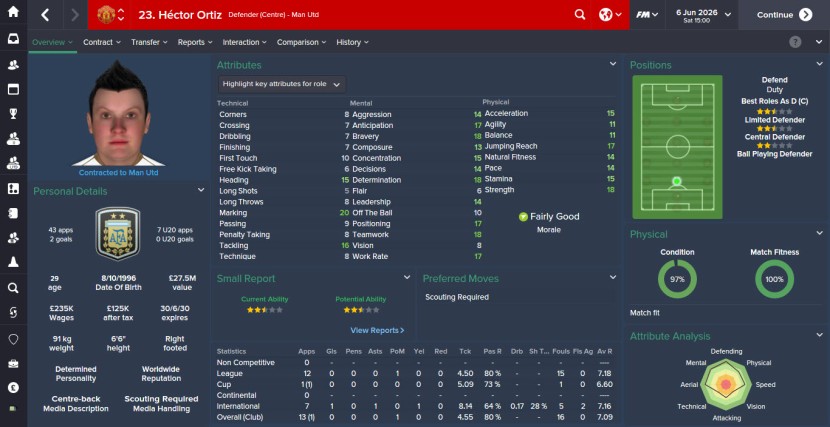
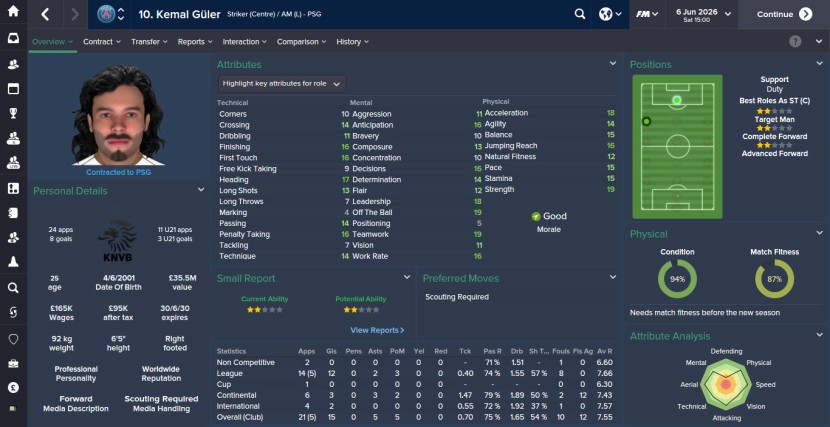










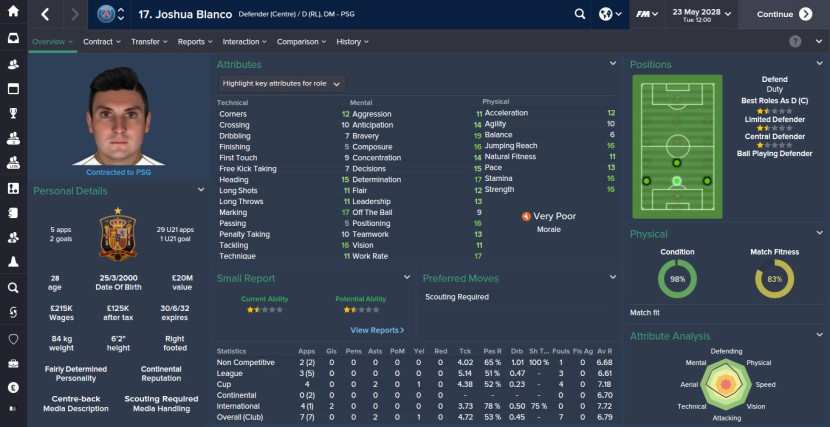

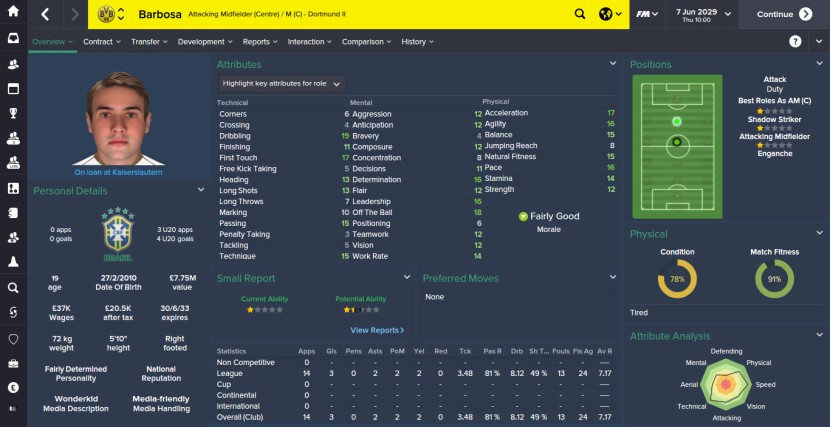

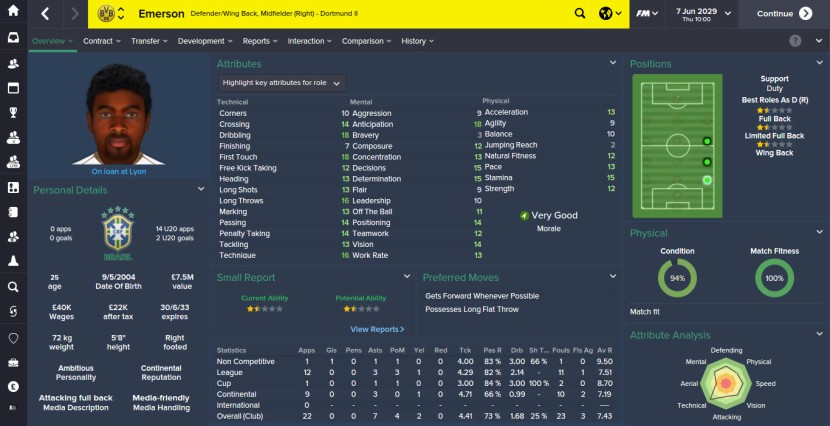
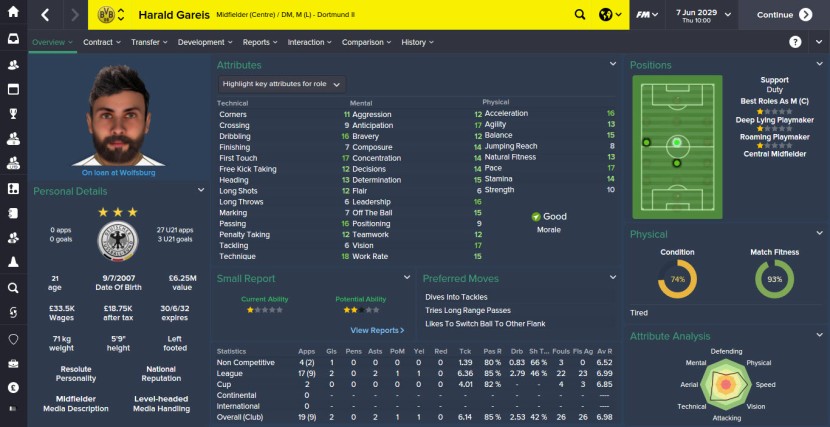


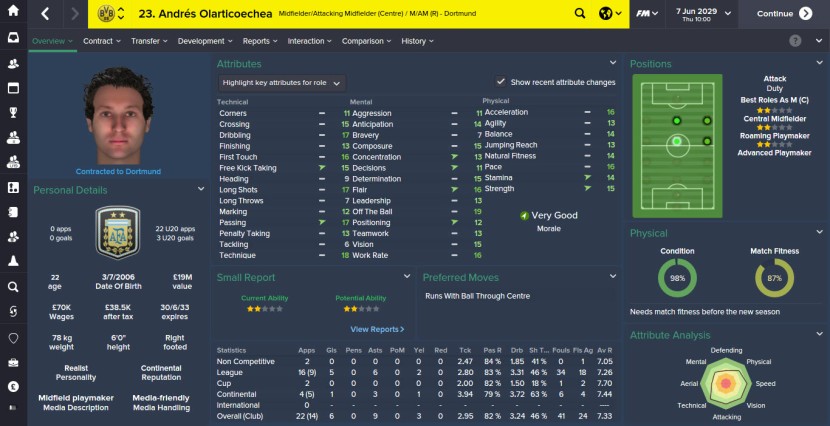

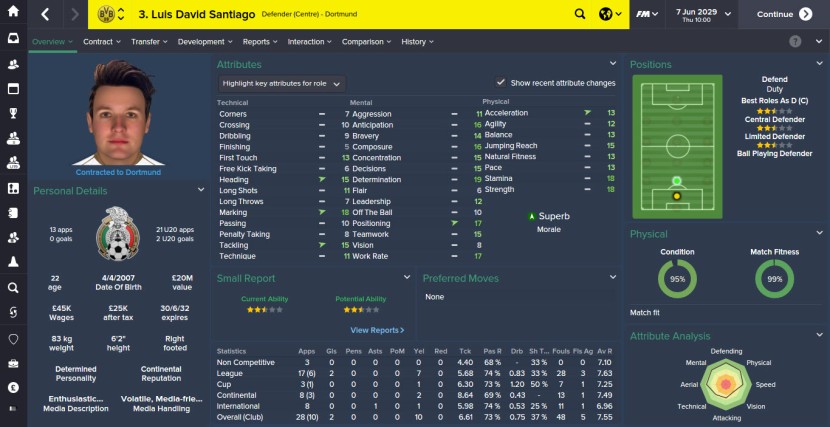

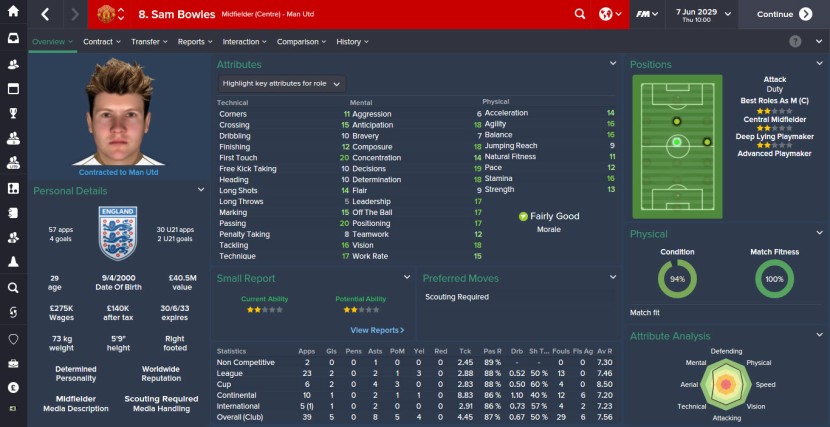






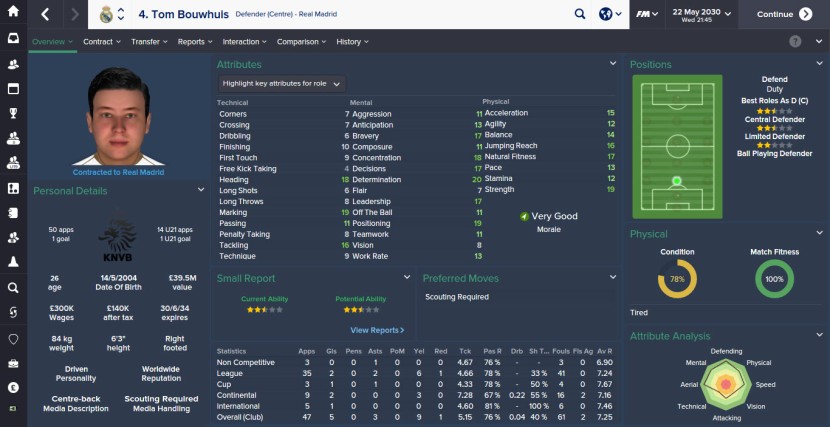


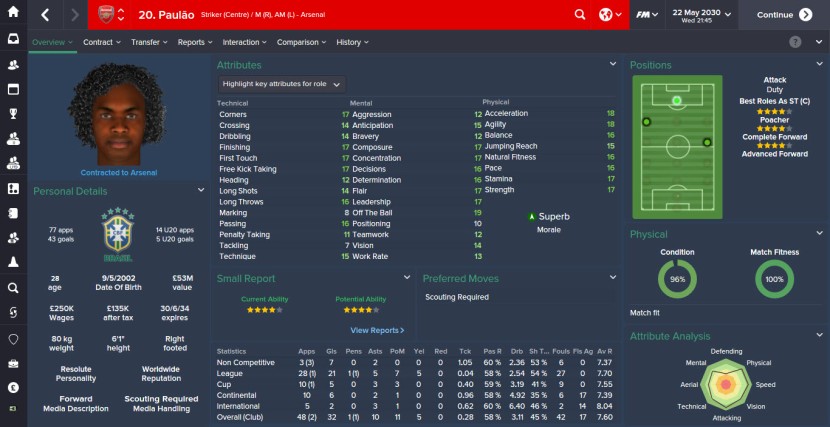



Great read that mate, made dinner even better 🙂
OK this is massive update, let me go and make a tea first 🙂
Really enjoyable read, could I ask where you got the player profile view from?
I use the player profile views from sortitoutsi.net
Thanks